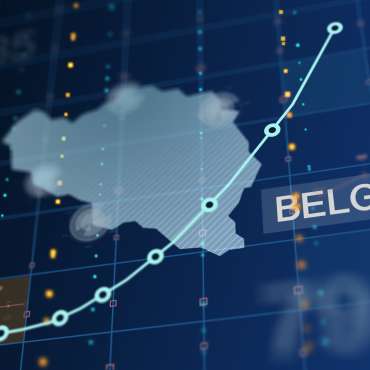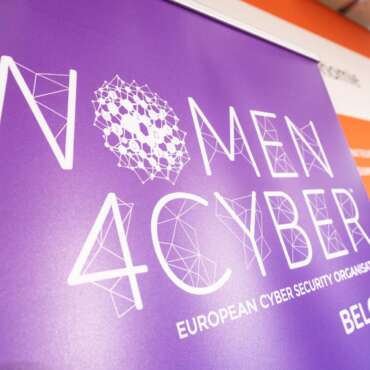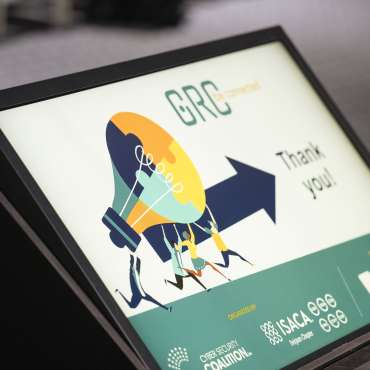AI and Cybersecurity
Cybersecurity is one of the multiple uses of artificial intelligence. AI, machine learning, and threat intelligence can recognize patterns in data to enable security systems to learn from experience. Instead of speculating about the world being taken over by sentient robots, let us take some time to share a common theoretical basis on AI and discuss realistic outcomes that can help us today in cybersecurity operations. In this BE-CYBER panel we brought together experts and practitioners for an in-depth panel discussion.
BE-CYBER Experience Sharing Event – 26 October 2022
Event hosted by the Cyber Security Coalition
Panel: AI and Cybersecurity
Moderator: Peter Van Hoorenbeeck, Solution Lead Security Analytics Davinsi Labs
Panellists:
- Jesse van der Zweep, AI & Cybersecurity Developer
- Johan Galle, Cybersecurity lecturer Howest
- Andy De Petter, Head of Global SOC Exclusive Networks
- Stephanie Cox, Managing Director Proximus Ada
#AI #artificialintelligence #machinelearning #incidentmanagement
A solid Smart City Cybersecurity Strategy
Safe.brussels’ central role is to coordinate prevention and security in the Brussels-Capital Region and to assist all the players concerned in order to guarantee the safety of the people of Brussels and of all those who visit the Region. How does cybersecurity fit within this mission? Find out more in this BE-CYBER presentation.
Les enjeux de la cybersécurité en Wallonie - Cyberwal
The Agence du Numérique (AdN) is a major facilitator in the ‘Digital Wallonia’ strategy – the roadmap for a digitally strong and inclusive Wallonia. In the update of the strategy, from 2021 till 2024, 15 million euro will be invested in core cyber security. In addition, a dedicated budget for innovation and research, such as the CyberWal research plan, has been put in place. Discover more about cybersecurity initiatives and projects in Wallonia in this BE-CYBER presentation.
BE-CYBER Experience Sharing Event – 26 October 2022
Event hosted by the Cyber Security Coalition
Introduction of the speakers by Fabrice Clément, CISO Proximus and Director Cyber Security Coalition
Presentation (in French) – Les enjeux de la cybersécurité en Wallonie – Cyberwal by Digital Wallonia – by Jéremy Grandclaudon, Cybersecurity Expert & Project Manager at Agence du Numérique and Axel Legay, Professor at UC Louvain.
#securitypolicy #cyberstrategy #cyberwal #digitalwallonia
Taking Belgium to the next level in cyber resilience
During the BE-CYBER experience sharing day, Phédra Clouner, Deputy Director of the CCB, updated us on progress made with the cybersecurity strategy 2.0 implementation, and the newly acquired responsibilities of the Centre for Cybersecurity Belgium. She also presented this year’s national awareness campaign, launched jointly with the Cyber Security Coalition, which focuses on protection against mobile viruses.
BE-CYBER Experience Sharing Event – 26 October 2022
Event hosted by the Cyber Security Coalition
Introduction of the speakers by Fabrice Clément, CISO Proximus and Director Cyber Security Coalition
Presentation (in French) – Les enjeux de la cybersécurité en Wallonie – Cyberwal by Digital Wallonia – by Jéremy Grandclaudon, Cybersecurity Expert & Project Manager at Agence du Numérique and Axel Legay, Professor at UC Louvain.
#securitypolicy #cyberstrategy #cyberwal #digitalwallonia
Vlaams Beleidsplan Cybersecurity
With the Flemish Cybersecurity Policy Plan approved on March 22nd, 2019, Flanders aims to address the many cybersecurity challenges in a rapidly digitizing society. The Plan includes an annual investment of EUR 20m and is based on three pillars: research, solutions for companies and awareness raising. What have been the achievements so far? What lies ahead? You’ll discover it during this BE-CYBER presentation by Patrick Hauspie (Vlaio).
BE-CYBER Experience Sharing Event – 26 October 2022
Event hosted by the Cyber Security Coalition
Introduction of the BE-CYBER Experience Sharing Event Programme by Fabrice Clément, CISO Proximus and Director Cyber Security Coalition
Presentation – Vlaams Beleidsplan Cybersecurity (in Dutch) by Patrick Hauspie, Programme Advisor AI & Cybersecurity Vlaio
#securitypolicy #cyberstrategy #vlaio
Sovereignty & data protection in the current geopolitical context
The first attack in the Ukraine war was not physical – it was digital. Shortly before the first missiles struck, Ukraine was being targeted by widespread malware attacks designed to disrupt access to information and critical services. As people were fleeing the country, they saw themselves cut off from essential data such as national IDs, biometric passports, birth certificates as they no longer had access to these data. Data Sovereignty is one of the concepts governments are using to protect citizens’ data. But what is Data Sovereignty, why is it important, and how does it affect businesses and citizens?
BE-CYBER Experience Sharing Event – 26 October 2022
Panel discussion: Sovereignty & data protection: evolution of the topic in the current geopolitical context (English spoken)
Moderator: Ulrich Seldeslachts, CEO Leaders in Security
Panellists:
- Jamal Shahin, Research Professor Institute for European Studies VUB
- David Dab, National Technology Office for Identity Data in the Netherlands
- Vincent Dock, Senior Strategy Manager Proximus
- Laurent Bounameau, DPO & CISO Belgian Geeral Inspectorate Federal Police and the Local Police
Some policy makers have tended to equate Data Sovereignty with Data Residency in the jurisdiction. The situation in Ukraine makes more and more people realize that the debate is more complex than just “my data needs to stay home”. In certain scenarios sovereignty is achieved by having your data secured outside the country in a data embassy or some safe technical enclave. Often too, the notion of sovereignty is not clarified in the form of policy objectives, a threat model, and controls & mechanisms to achieve objectives in the context of a threat model. Therefore, the same word can be used for different things (autarky, resiliency, etc.). There are also plenty of tradeoffs to be made. In this debate we address both the technical and geopolitical dimensions of the issue.
#digitalsovereignty #datasovereignty #dataprotection
European Digital Wallet - Legal and security aspects
The EU Digital Identity Wallet is a European Commission Project that aims to enable a unified digital identification system in Europe. This Wallet will allow European citizens to safely save their documents and personal information in an app. These documents and information comprehend much more than just citizens’ identity documents or driving licences, but also medical records, bank cards or even university degree titles. Altogether, this data will be able to create a global EU Digital Identity for every citizen which they will be able to use across every member state. During this BE-CYBER roundtable, panellists from the private, public and academic sectors discussed the legal and security aspects of the Wallet implementation.
Panel discussion: European digital identities: legal and security challenges
Moderator: Erik Van Zuuren, Founder TrustCore.EU
Panellists:
- Hugo Mania, Prohect Manager Digital Identities & Biometrics, ANSSI
- Evgenia Nikolouzou, Cybersecurity Officer ENISA
- Bart Preneel, Professor KU Leuven
- Bogdan Stefan, Head of Sector Policy Officer European Commission
- Bart Symons, Director ZetesConfidens
After having looked at this EUDI-wallet from a functional point of view, what about the trust, security, privacy dimensions? Can we “trust” this eco-system? What are the elements that determine its trust framework? How can we make sure that an EUDI wallet can really be made very secure on any mobile device? How can we make sure that the citizen’s privacy will be “by design” protected? What does it mean when the proposal states that it should be made technically impossible to track the usage of the citizen? How will a citizen know that service providers are not asking for too many attributes or attestations from them? How can a Belgian citizen company determine trust in a service provider in, for instance, Spain it wants to do business with? How will it be able to determine that party’s identity? How to trust its attestations? How will that Spanish service provider strongly authenticate a Belgian EUDI and trust its attestations and signature?
European Digital Wallet - Business implementation
The EU Digital Identity Wallet is a European Commission Project that aims to enable a unified digital identification system in Europe. This Wallet will allow European citizens to safely save their documents and personal information in an app. These documents and information comprehend much more than just citizens’ identity documents or driving licences, but also medical records, bank cards or even university degree titles. Altogether, this data will be able to create a global EU Digital Identity for every citizen which they will be able to use across every member state. During this BE-CYBER roundtable, panellists from the private, public and academic sectors discussed the business aspects of the Wallet implementation.
BE-CYBER Experience Sharing Event – 26 October 2022
Host: Cyber Security Coalition
Panel discussion: European digital identities: the challenges for business implementation
Moderator: Erik Van Zuuren, Founder TrustCore.EU
Panellists:
- André de Kok, Researcher National Office for Identity Data in the Netherlands
- Katryna Dow, CEO & Founder Meeco
- Hugo Mania, Project Manager Digital Identities & Biometrics, ANSSI
- John van der Heyden, Strategy Advisor BNP Paribas Fortis
- Jack Hamande, Director General Digital Transformation, FPS Policy & Support
Europe is rewriting the Trust Regulation which will include significant changes in the area of Digital Identity. Soon every citizen and legal entity should have a wallet that allows strong identification/ authentication, that allows to present/exchange “electronic attestations of attributes”, that allows digital signing. If large players on the internet will be obliged to accept this EUDI wallet, if remote signing will be omni-available, if (qualified) reliable attestation can be presented directly from the citizen’s EUDI wallet, how will this impact the digital eco-system? Will online processes finally be capable of being fully digitized? Will banks, for instance, be able to automate their eKYC-processes? Can a Belgian firm finally trade cross border in full confidence? Will online fraud drop and online trust increase?







